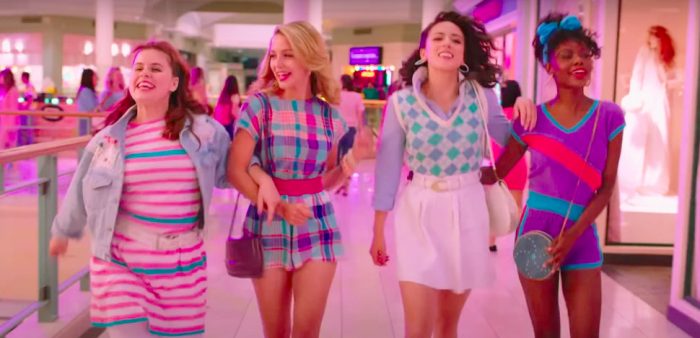|
by Philip Price Director: Rachel Lee Goldenberg Starring: Jessica Rothe, Josh Whitehouse & Jessie Ennis Rated: PG-13 Runtime: 1 hour & 42 minutes Having not seen the original “Valley Girl” I was completely down for the level of ‘80s nostalgia and amount of Jessica Rothe (“Happy Death Day”) director Rachel Lee Goldenberg would be bringing in her re-make of the 1983 film that starred Nicolas Cage and Deborah Foreman. I mean, giving Rothe her “La La Land” dues would have ultimately been enough to make the time and money worth it and in regards to Rothe as a performer and the opportunity this affords her in broadening the case of her talent it does a fine enough job, but unfortunately the movie overall is more earnest than it is aware which unfortunately ends up sucking a lot of the fun that seems to be bubbling just beneath the surface out of the equation. It’s difficult to tell if this has more to do with a pacing issue or the lack of chemistry between Rothe and Josh Whitehouse (filling the role originated by Cage), but the lack of energy and inventiveness in the majority of the musical numbers combined with the desire for them to be received as critical and credible rather than giddy and absurd genuinely detracts from and makes a difference in the impact the film could have, but doesn’t make. This is also essentially an ‘80s set version of “Grease” which in turn was a more modern day take on Romeo & Juliet meaning there needs to be a bigger hook than just the narrative concerning star-crossed lovers. Whether those hooks be the music or the investment in the love story or whatever else a person with a particular vision might latch onto in their interpretation 2020’s jukebox musical version of “Valley Girl” just doesn’t have any of them; leaving viewers longing for a soul that clearly exists, but can’t seem to escape the sheen it’s encased in. Acting less like punks and more like actual, indulgent rock stars would have taken this thing a lot further.
There are plenty of topics up for discussion around this updated “Valley Girl,” both good and bad, as one could discuss how the framing device with Alicia Silverstone and Camila Morrone isn’t really necessary or how between this and the underrated “Life of the Party” that Jessie Ennis is low-key becoming a great comedic character actor. One could also discuss how much appreciation there is for having Nicole Byer stop by for a cameo as the deejay at the skating rink which allows her just enough room to ad lib some of the best lines in the movie. You know…one could even talk about the casting of Judy Greer and Rob Huebel as the parents of Rothe’s Julie Richman who are each always a joy in their own right, but how it’s Huebel who generates a genuinely moving moment that clearly and expertly conveys the only message “Valley Girl” really needed to hit home. And while we’re on the topic of compliments and as insane as this compliment may sound-there is a moment when the re-creation of 1980s Hollywood Boulevard is almost ‘Once Upon a Time in Hollywood’-ish in nature. Seriously, I was fully in on this particular moment and was careful to take note of the car models and business signs that all rang true of the era, something I’m not typically keen to notice, but couldn’t help but bask in noticing the changes between it and Tarantino’s ‘60s-set opus last summer. For all the momentum these constructive elements bring to the table though, the biggest component of a musical-the music-is what derails “Valley Girl” from capitalizing on all the goodwill a love story set in a decade everyone has rose tinted glasses for at the moment featuring music from that same decade would seemingly have. In essence, the updated versions of the songs featured in the film lack an edge to them and instead sound like a "Kidz Bop goes 80's compilation” where the Kidz Bop kids are starting to mature, but still want to record under the same banner. Worse even is the fact the song choices are obvious, on the nose, and played out. The lone exception is the film’s rendition of "Under Pressure" which is the only selection that actually feels creative in how the song and lyrics are integrated into the narrative and filmmaking language. Much like the tone of the film overall, the musical numbers never fully lean into the sillier, more frivolous aspects of what is occurring and instead are played as serious odes to romance and the ideological divide between the youth and the old. But I mean … if the name of your movie is “Valley Girl” the last thing it should be doing is taking itself seriously. That the movie doesn’t know how goofy it is and doesn’t lean into how much it’s knowingly turning the eighties up to eleven in every aspect of its set design, wardrobe, verbiage, and the romanticizing of it all forces the acknowledgement that something is off; that whatever Goldenberg and co. wanted this to be while making it doesn’t translate in the thick of the scenes themselves. Still, it’s easy to admire and even give the film a pass due to the aforementioned earnestness of how goofy the presentation is. Viewers, myself included, consistently hope for greater heights to be reached as our core group of girlfriends sing a melody featuring “Material Girl”, “I Can’t Go for That” and “Tainted Love” while bouncing around in extremely outlandish workout clothes complete with mountains of spandex and plenty of leg warmers, but it ends up only feeling like the movie wants us to be more impressed with it than in on the fun of it to the point it would almost feel rude to call it silly … but it’s totally silly.
0 Comments
Leave a Reply. |
Archives
May 2024
|
